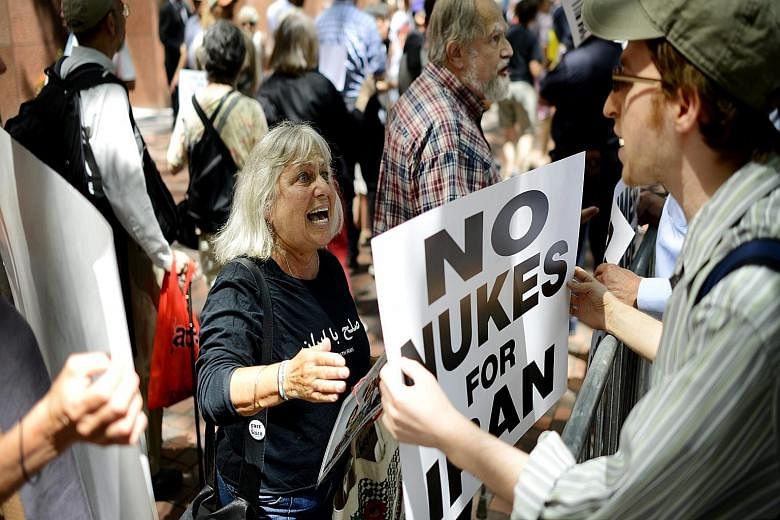WASHINGTON • Some of the wealthiest and most powerful donors in American politics are trying to sway opinion for and against the Iran nuclear accord.
Approaching a vote on President Barack Obama's most important international priority, the fight is expanding, with tens of millions of dollars flowing into ad campaigns, and contributors leveraging access to undecided Democrats.
Jewish philanthropist S. Daniel Abraham, who made billions on SlimFast drinks, dispatched e-mail messages to Senate Democrats while holidaying in St Tropez, urging their support. And gay rights patron Tim Gill quietly urged lawmakers to back Mr Obama, telling them the deal is in Israel's best interest.
TV producer Norman Lear, who has raised millions for Democrats, said he wrote to Senator Chuck Schumer to criticise his decision to oppose the Iran nuclear accord.
"At the very least, it was a mistake," Mr Lear said.
In contrast, New York financier John Shapiro, a leader of the American Jewish Committee, said he spoke to Mr Schumer about his meeting with Egyptian President Abdel Fattah al-Sisi, including the leader's warning that the agreement would increase regional terrorism. He also related discussions with officials in Jordan, and made sure that Mr Schumer had read critical essays and columns.
The furious lobbying lays bare the volatile politics of the Iran accord, which has already pitted Mr Schumer, the likely future leader of Senate Democrats, against the Democratic president.
It also reveals donors' divisions over the deal - and the extraordinary access those donors have wielded to speak directly to lawmakers and their top aides.
Mr Schumer said on Wednesday that he did not believe all the activity would ultimately determine the deal's fate nor, he said, had donor appeals determined his decision.
He said: "All the Sturm und Drang (storm and stress) around this is going to mean less than on less important issues.
"I know that sounds ironic, but the more substantive the decision, the less the push and pull matters."
Donors said they did not believe any senator would vote based on threats to give or withhold money - and none admitted to giving such ultimatums. But with super political action committees (PACs) poised to dump huge sums of money into Senate races next year, the passions of big contributors - and their ability to change a candidate's fortunes - are a keenly felt undercurrent. Some of the biggest donors to super PACs also have strong opinions about the Iran deal.
Among them are billionaire investor George Soros and entertainment mogul Haim Saban on the left, for example, and hedge fund investor Paul Singer and casino billionaire Sheldon Adelson on the right.
"I am sure that there is a level of risk on either side of this very sensitive question," said prominent New York lawyer and Schumer benefactor Victor Kovner, who knows of donors considering a boycott of Democrats who follow Mr Schumer's lead. "I continue to support Senator Schumer, although I am deeply disappointed with this decision."
Republican leaders have promised a vote in mid-September in both Houses on a resolution to disapprove the accord. So far, Mr Schumer is the only Senate Democrat to formally express opposition, although more are likely.
Mr Obama has said he will veto such a resolution.
NEW YORK TIMES

